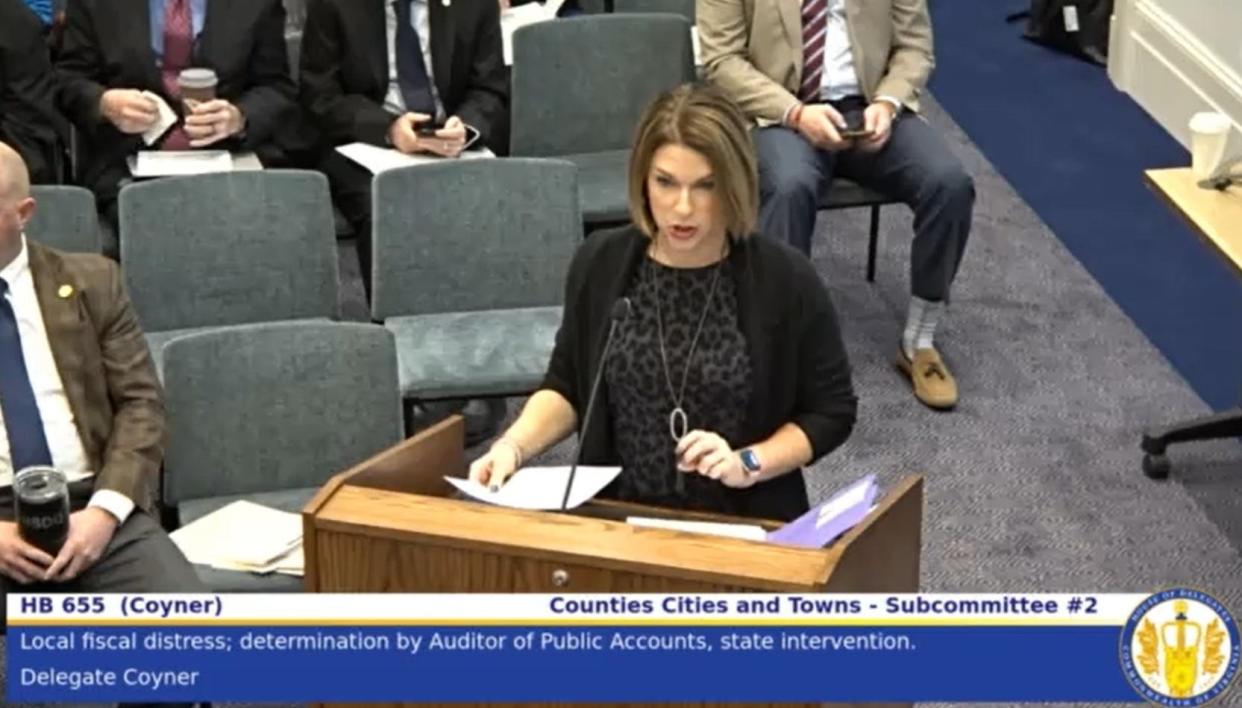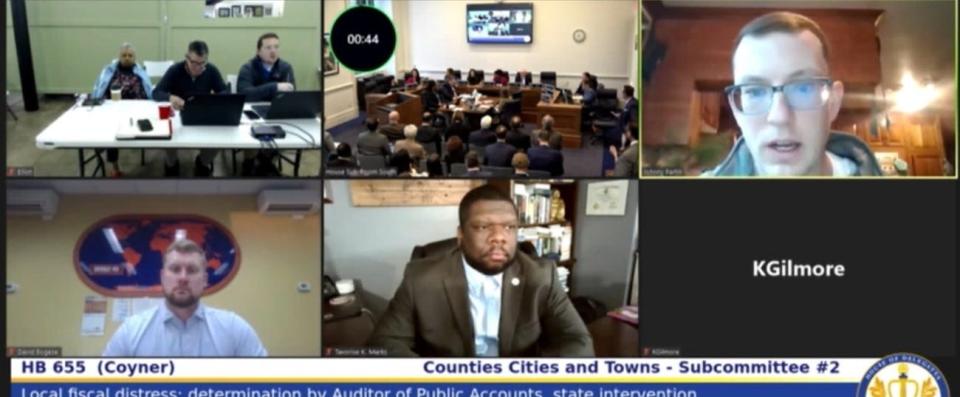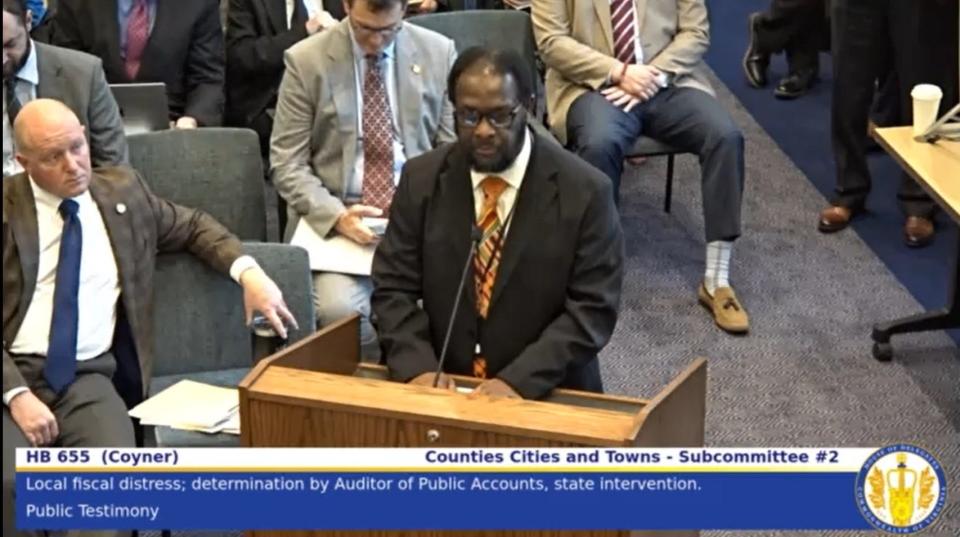House subcommittee recommends tabling Hopewell-triggered fiscal-distress bill

RICHMOND – A House subcommittee has recommended tabling legislation on the extent of the state’s input into assisting fiscally distressed localities, saying that “a little more work needs to be done” to resolve the perception of the state stepping on a locality’s toes to get the books back in shape.
The 6-3 vote along party lines followed more than 20 minutes of discussion and testimony from both sides. Supporters said the process created by Del. Carrie Coyner’s bill was overdue and could have saved earlier localities that had maxed out on their money matters, while opponents claimed the bill usurped a local governing body’s authority to regulate its spending systems.
Thursday’s vote by the subcommittee was not the final action on the legislation. Instead, it was a recommendation that the full House Counties, Cities & Towns Committee keep the bill from moving forward. That committee meets Friday morning and is expected to take up the subcommittee’s recommendation at that time.
Similar legislation in the Senate was addressed earlier in the week by the Senate Local Government Committee. A vote on that is expected Monday.
Yet to be determined, though, is whether the House action would be a precursor to what the Senate does. The Senate bill is sponsored by Sen. Lashrecse Aird, D-Petersburg, and Democrats have narrow majorities in both the House and Senate.
Who said what and why
The question of state overreach appeared to doom the bill’s chances in the subcommittee. Originally drafted to give the governor the power to appoint an “emergency fiscal manager” to take the financial reins of the distressed locality, it was amended to turn that power over to the Virginia Commission on Local Government.
“We felt the Commission on Local Government was a very neutral commission, and they would be able to provide that oversight and direction, and take it out of some of the politics,” Coyner said. She credited her Senate counterparts for “wrestling with that issue” and suggesting the COLG.
“This bill is really focused on people, not politicians,” Coyner said.
The bill would allow the state auditor of public accounts to put any locality on notice that is delinquent in submitting its required yearly money audits.
In her initial presentation, Coyner did not specifically mention Hopewell as the catalyst for the legislation, but subsequent speakers did. And while not mentioning the city by name, she did cite last year’s showdown between Gov. Glenn Youngkin’s administration and five members of Hopewell City Council over the extent of the state’s intervention into Hopewell’s ledgers.
“That locality was unreceptive to our offers,” Coyner said.
Hopewell ultimately rejected the state’s help and hired the Robert Bobb Group to help reboot its financial processes and policies.
Those who followed Coyner to the podium, however, made it clear that they were speaking of Hopewell. Many of them represented the city’s business community and spoke of how Hopewell’s past lackadaisical approach to balancing its checkbook led to the city losing its ability to issue bonds to cover capital infrastructure improvements.

Andrew Parker, secretary of the board of the Hopewell-Prince George Chamber of Commerce, said ongoing challenges have impacted Hopewell’s ability to “demonstrate sound fiscal stewardship.” While there have been steps in a positive direction lately, Parker said the concerns remain.
“Access to capital is important for all organizations,” he told the subcommittee. “And our members continue to be distressed by the fact that the city is missing opportunities to refinance its existing debt, an action that could have saved city taxpayers $15 million. It’s also impacted our membership’s ability to receive their own loans, to start their own small businesses and develop the community that we all want to have in the city.”
Stacie Gordon, government affairs manager for the Virginia Manufacturers Association, said due to the inability to bond, Hopewell raised its machinery and tools tax, the first locality in two decades to do so.
“This has made Hopewell one of the least attractive locations to recruit new and expand existing manufacturing in the commonwealth,” Gordon said.
Local businessmen Tavorise Marks and David Bogese testified remotely in support of the bill, as did Mayor Johnny Partin and Ward 1 Councilor Rita Joyner. Partin and Joyner’s support contrasted sharply from their other five colleagues on council as Hopewell’s legislative liaison bullet-pointed a letter those five sent to the General Assembly last week urging defeat.
“We believe [the legislation] usurps the elected governing authority and does not consider their views and actions,” Herbert Bragg told the subcommittee.

Bragg was followed by the Virginia Municipal League and the Virginia First Cities Coalition, who also noted overreach as their main concerns.
“There is a process already in place ... to identify localities in fiscal distress,” VML fiscal policy director Joe Flores said. “That process works and has worked in this instance.”
Kelly Harris-Braxton, executive director of Virginia First Cities, said the legislation “is in a better place than it was” when first introduced “but we do have concerns about the overreach of the bill still.”
Del. James Morefield, R-Tazewell County, made a motion to report the legislation, but that was quickly superseded by Del. Shelly Simonds, D-Newport News, who suggested tabling the bill because this “seems to need a little bit more work.”
Simonds and Democratic Dels. Briana Sewell of Woodbridge, Atoosa Reaser of Loudoun County, Katrina Callsen of Charlottesville, Laura Jane Cohen of Fairfax County, and Candi Mundon King of Stafford County, voted to table the bill. Voting to advance it were Morefield and GOP Dels. Keith Hodges of Urbanna and Anne Tata of Virginia Beach.
Bill Atkinson (he/him/his) is an award-winning journalist who covers breaking news, government and politics. Reach him at batkinson@progress-index.com or on X (formerly known as Twitter) at @BAtkinson_PI.
This article originally appeared on The Progress-Index: House subcommittee recommends tabling Hopewell-triggered fiscal-distress bill

